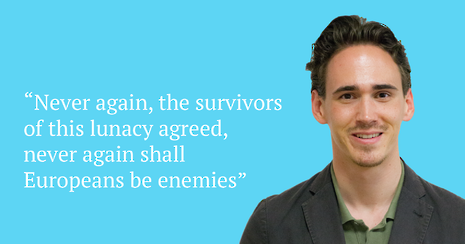We must not forget the fields of Flanders
The EU referendum: student perspectives

These are troubled times for Europe. Right at the heart of the continent, in the administrative capital of the EU, bombs detonate, people suffer and die. Europe has been struck by shocking terror attacks, but avowals of solidarity follow the fading bursts of bombs. In the face of the horror which threatens our shared values, Europeans show whole-hearted and honest compassion for each other.
Nevertheless, the bloodshed in the middle of Europe, in Paris and in Brussels, seems mind-bending and surreal to us, since terror and war are distant memories for the ‘blessed generations’. As the news unfolds, we remember a seemingly distant time, 100 years ago, when European soil was blood-soaked before; Europeans stood opposed to each other in hostility and hatred rather than side-by-side in solidarity and compassion. A time when we Europeans murdered each other: a time of paranoia, fuelled by aggressive nationalism and led by ignorance.
The young soldiers in the trenches of Flanders and Verdun did not recognise that the hopes, fears, and dreams of the young men they fought were the same as their own. Instead, they set Europe on fire. They destroyed their generation’s prospects, and they then were caught up in an even more cruel turmoil only 30 years later. Never again, the survivors of this lunacy agreed, never again shall Europeans be enemies. This was the initial motivation of the European project.
In the last 70 years, this spirit has come to life in the many endeavours of the EU. Just half a decade after World War Two, this spirit bound together enemies of war in the Treaty of Paris. It created a united Europe across the channel in 1973. That spirit of togetherness backed Eastern neighbours when walls were built, and welcomed them as the Iron Curtain fell.
Today, this spirit has formed an ‘Erasmus generation’ of young Europeans that could never fight against each other, for they have lived under one roof. They have shared their hopes, fears, and dreams. The European idea has brought them together and has successfully prevented history from repeating itself once more. For keeping this initial, most fundamental and most important promise of peace and stability between the people of Europe, the EU is a true success story.
The current debate about how the EU operates and who should participate in it should first consider this fact, which ultimately outbalances any other economic argument. We should not forget the fields of Flanders, not only on Remembrance Day, but also on Thursday 23rd June.
 News / Cambridge study finds students learn better with notes than AI13 December 2025
News / Cambridge study finds students learn better with notes than AI13 December 2025 News / Cambridge Vet School gets lifeline year to stay accredited28 November 2025
News / Cambridge Vet School gets lifeline year to stay accredited28 November 2025 Science / Did your ex trip on King’s Parade? The science behind the ‘ick’12 December 2025
Science / Did your ex trip on King’s Parade? The science behind the ‘ick’12 December 2025 News / Uni Scout and Guide Club affirms trans inclusion 12 December 2025
News / Uni Scout and Guide Club affirms trans inclusion 12 December 2025 Arts / Modern Modernist Centenary: T. S. Eliot13 December 2025
Arts / Modern Modernist Centenary: T. S. Eliot13 December 2025









